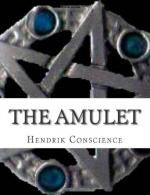He put the twenty crowns with the rest of the money, and having satisfied himself that no more remained on the person of Julio, he was about to transfer the crowns to his pocket, when a sudden idea occurred to his mind.
“If I leave all this money on his person, they might think he had been paid to commit the deed; if I leave nothing, there will be no reason to conclude that he killed the Signor Geronimo to rob him. I wonder how much money Geronimo generally carried about him. I should suppose five or six crowns, or perhaps ten. I will leave six crowns and all the small change. And the keys? He must keep them, or, of course, he could not have entered without my knowledge. But should he be roused to consciousness by the death-agony, he might have sufficient strength to get out. I will leave him all the keys but that of the outer building. Iron bars render the place secure; he could not even enter the garden. Now I will put the phial in his doublet—no, in the pocket of his girdle; it will be as easily found. I will remove the bottles and everything which could indicate the presence of two persons.”
He locked up the bottles and glasses, arranged the chairs, and wiped up the wine which had been spilled on the table and the floor.
While thus engaged, he muttered to himself:
“I must not remain longer. I myself must go to the bailiff and accuse Julio of the murder. Shall I go this evening? No; they might come and find him alive, and a powerful antidote might perhaps rouse him from sleep. To-morrow, then—to-morrow morning. But how shall I explain the affair? When and how did he reveal his crime? Night will suggest a means. All is done. I will go home and appear calm and cheerful.”
He threw his cloak around his shoulders, took the lamp from the table, and walked to the door. There he stopped for a moment to contemplate his victim and precipitately descended the staircase. At the foot of the steps he extinguished the light, traversed the garden, opened the gate, and disappeared in the darkness.
CHAPTER XI.
FOOD AT LAST—DEATH OF JULIO.
When Julio left the cellar for the purpose of procuring bread, Geronimo cast himself on his knees, full of gratitude to God, to return thanks for the unexpected deliverance.
Julio had said “soon,” but an hour passed, then another, then many more, and he came not.
A painful doubt began to take possession of Geronimo’s mind. Had an accident happened to Julio? Had he perhaps cruelly abandoned his victim? Had he set out for Germany with the certainty that hunger would kill him whom the dagger had spared?
The unfortunate cavalier had no means of measuring the flight of time. What in the immutable darkness of his prison seemed to him a century, might in reality be only a few hours, and the promised bread would soon appear to his eyes as the star of safety—in a quarter of an hour, in a minute—that very instant.




